
FACULTY OF HEALTH SCIENCES
Department of Nursing
HEM 340 | Course Introduction and Application Information
| Course Name |
Growth and Development of 0-6 Year Old Children
|
|
Code
|
Semester
|
Theory
(hour/week) |
Application/Lab
(hour/week) |
Local Credits
|
ECTS
|
|
HEM 340
|
Fall/Spring
|
3
|
0
|
3
|
4
|
| Prerequisites |
None
|
|||||
| Course Language |
Turkish
|
|||||
| Course Type |
Elective
|
|||||
| Course Level |
First Cycle
|
|||||
| Mode of Delivery | Online | |||||
| Teaching Methods and Techniques of the Course | DiscussionCase StudyLecture / Presentation | |||||
| Course Coordinator | ||||||
| Course Lecturer(s) | ||||||
| Assistant(s) | - | |||||
| Course Objectives | At the end of this course, the students are aimed to learn the characteristics of childhood 0-6 age period and necessary concepts and theories about this turn. |
| Learning Outcomes |
The students who succeeded in this course;
|
| Course Description | This course covers the description of growth and development, theories of growth and development, specific physical, emotional, social, cognitive development and normal deviations from 0-6 years of age and behavioral disorders frequently seen in childhood. |
|
|
Core Courses | |
| Major Area Courses | ||
| Supportive Courses |
X
|
|
| Media and Management Skills Courses | ||
| Transferable Skill Courses |
WEEKLY SUBJECTS AND RELATED PREPARATION STUDIES
| Week | Subjects | Related Preparation |
| 1 | Introduction Definition of Growth and Development | Yeşilyaprak B. (2004). Gelişim ve Öğrenme Psikolojisi. 10. Baskı, Pegem yayıncılık, Ankara. ISBN-ISSN 975-6802-77-4 s: 27-73 Ergin, H., Yıldız, A. (2010). Gelişim Psikolojisi. 2. Baskı, Nobel yayıncılık, Ankara. ISBN-ISSN 978-605-395-313-5 s:33-37 |
| 2 | Growth and Development Theories | Yeşilyaprak B. (2004). s:75-132 Ergin, H., Yıldız, A. (2010). s:7-14 |
| 3 | Factors Affecting 0-6 Age Growth and Development | Yeşilyaprak B. (2004). s: 132-140. Ergin, H., Yıldız, A. (2010). s:40-51 |
| 4 | 0-6 Age Physical Growth and Evaluation Criteria | Ergin, H., Yıldız, A. (2010). s:17-21 |
| 5 | Neuromotor Development Process | Yeşilyaprak B. (2004). s: 75-107 Ergin, H., Yıldız, A. (2010). s:104-138 |
| 6 | Development Process of Sensory Organs and Preparing the Child for Toilet Training | Ergin, H., Yıldız, A. (2010). s:67-96 |
| 7 | Midterm | |
| 8 | Intelligence and Mental Development | Sak, U. (2016). Zeka ve Gelişimi. In book: Eğitim Psikolojisi Chapter 4: Publisher: Anadolu Üniversitesi Basımevi. https://www.researchgate.net/publication/315447805_Zeka_ve_Gelisimi |
| 9 | Psychosocial Development Process | Ergin, H., Yıldız, A. (2010). s:144-179 Yeşilyaprak B. (2004). s: 109-140 |
| 10 | Child and Game | Kurt, G., Özkaya tortamış, B. (2015). Çocuk ve oyun: Çocukların öğrenmesini ve anlamasını destekleme In book: Okul Öncesi Eğitime Giriş Edition: 2 Chapter: 6 Publisher: Eğiten Kitap. https://www.researchgate.net/publication/338607168_Cocuk_ve_oyun_Cocuklarin_ogrenmesini_ve_anlamasini_destekleme Ayan, S., Memiş, A.U. (2012). Erken Çocukluk Döneminde Oyun. Selçuk Üniversitesi Beden Eğitimi Ve Spor Bilim Dergisi, 14 (2): 143-149 https://www.acarindex.com/dosyalar/makale/acarindex-1423931789.pdf |
| 11 | Criteria for Diagnosis of Normal Deviation in Child's Growth and Development Process | Tunçeli, H. İ., Zembat, R. (2017). Erken Çocukluk Döneminde Gelişimin Değerlendirilmesi ve Önemi. Eğitim Kuram ve Uygulama Araştırmaları Dergisi Cilt 3, Sayı 3, s:01-12. https://dergipark.org.tr/tr/download/article-file/339966 Alabay, E. (2016). Türkiye’de ve Dünyada Gelişimsel Tanı ve Değerlendirme Süreci. Anadolu Üniversitesi Yayınları. https://www.researchgate.net/publication/341001121_Turkiye'de_ve_Dunyada_Gelisimsel_Tani_ve_Degerlendirme_Sureci |
| 12 | The Effects of Childhood Stimuli on Growth and Development | Yeşilyaprak B. (2004). s: 132-140. Ergin, H., Yıldız, A. (2010). s:235-242 |
| 13 | Childhood Rights (new-child rights) and Neglect-Abuse | Ergin, H., Yıldız, A. (2010). s:245-256 |
| 14 | Behavior Disorders Frequently Visible in Childhood | Ergin, H., Yıldız, A. (2010). s:265-288 |
| 15 | Course review | |
| 16 | Final exam |
| Course Notes/Textbooks |
2. Ergin, H., Yıldız, A. (2010). Gelişim Psikolojisi. 2. Baskı, Nobel yayıncılık, Ankara. ISBN-ISSN 978-605-395-313-5 |
| Suggested Readings/Materials |
EVALUATION SYSTEM
| Semester Activities | Number | Weigthing |
| Participation | ||
| Laboratory / Application | ||
| Field Work | ||
| Quizzes / Studio Critiques |
1
|
10
|
| Portfolio | ||
| Homework / Assignments |
1
|
20
|
| Presentation / Jury | ||
| Project | ||
| Seminar / Workshop | ||
| Oral Exams | ||
| Midterm |
1
|
30
|
| Final Exam |
1
|
40
|
| Total |
| Weighting of Semester Activities on the Final Grade |
3
|
60
|
| Weighting of End-of-Semester Activities on the Final Grade |
1
|
40
|
| Total |
ECTS / WORKLOAD TABLE
| Semester Activities | Number | Duration (Hours) | Workload |
|---|---|---|---|
| Theoretical Course Hours (Including exam week: 16 x total hours) |
16
|
3
|
48
|
| Laboratory / Application Hours (Including exam week: '.16.' x total hours) |
16
|
0
|
|
| Study Hours Out of Class |
0
|
||
| Field Work |
0
|
||
| Quizzes / Studio Critiques |
1
|
7
|
7
|
| Portfolio |
0
|
||
| Homework / Assignments |
2
|
10
|
20
|
| Presentation / Jury |
0
|
||
| Project |
0
|
||
| Seminar / Workshop |
0
|
||
| Oral Exam |
0
|
||
| Midterms |
1
|
20
|
20
|
| Final Exam |
1
|
25
|
25
|
| Total |
120
|
COURSE LEARNING OUTCOMES AND PROGRAM QUALIFICATIONS RELATIONSHIP
|
#
|
Program Competencies/Outcomes |
* Contribution Level
|
||||
|
1
|
2
|
3
|
4
|
5
|
||
| 1 | To be able to have basic theoretical and practical knowledges in line with scientific developments in the field of nursing and health sciences for family and community health and well-being |
X | ||||
| 2 | To be able to use the basic theoretical and practical knowledges to meet the health care requirements of family and community with holistic approach. |
X | ||||
| 3 | To be able to follow the evidence-based practices and new approaches by performing nursing practices. |
|||||
| 4 | To be able to maintain responsibility of improving by itself while adopting the importance of lifelong learning and following scientific, technological and current practices. |
X | ||||
| 5 | To be able to communicate effectively with individuals, families, communities and healthcare team in applications. |
X | ||||
| 6 | To be able to occur on the professional platforms having the individual study skills, ability to decide independently, and aware of their legal rights and responsibilities. |
|||||
| 7 | To be able to do team working in disciplinary and interdisciplinary. |
|||||
| 8 | To be able to organize the projects and events for the living social environment with social responsibility and to apply them. |
|||||
| 9 | To be able to evaluate the applicability of research results, use in nursing practices, identify new problem areas and think critically. |
|||||
| 10 | To be able to act according to the social, scientific and ethical values in nursing, during the period of data collection, interpretation, implementation of initiatives and evaluation of results. |
X | ||||
| 11 | To be able to collect data in the areas of Nursing and communicate with colleagues in a foreign language. |
|||||
*1 Lowest, 2 Low, 3 Average, 4 High, 5 Highest
NEWS |ALL NEWS
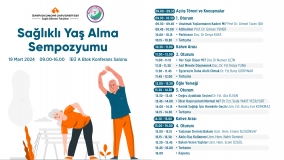
Healthy Aging Symposium
Moderated by the Department of Physiotherapy and Rehabilitation, Faculty of Health Sciences, Izmir University of Economics, Faculty of Health Sciences, in cooperation
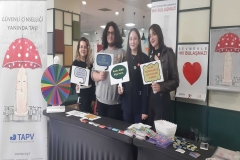
Are you aware? HIV/AIDS
HIV/AIDS Awareness Week events, prepared with the contributions of İzmir University of Economics Faculty of Medicine, Faculty of Health Sciences, and EKOKAM,
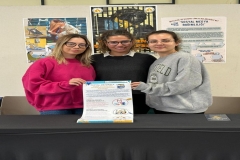
Digital Addiction Stand
A stand was established by the students of the Department of Nursing, Faculty of Health Sciences, Izmir University of Economics, on November
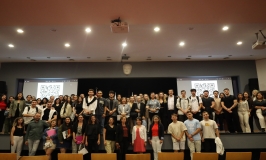
2023-2024 Academic Year Faculty of Health Sciences Opening Lecture
Izmir University of Economics Faculty of Health Sciences 2023-2024 Academic Year Opening Lecture titled 'Relationship between Cancer and Nutrition from Antiquity to

‘Surgical nursing’ summit in Kuşadasi
The ‘Congress of the Turkish Society of Surgical and Operating Room Nurses’, which will be organized internationally this year with the cooperation
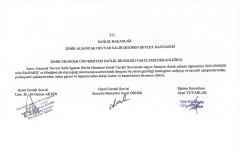
Internship Success from Our Students
Dilara Kına and Sıla Barış, our students from the nursing department, were given a certificate of appreciation for their professional approach, outstanding
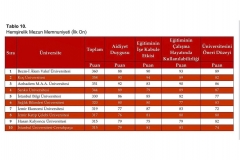
Satisfaction of Our Graduates
We are ranked 7th among Nursing programs in the University Research Laboratory (Uniar)'s graduate satisfaction 2023 report. Thank you to our alumni

Our 2022-2023 Academic Year Graduation Ceremony
İzmir University of Economics 2023 graduation ceremony was held at Göztepe Gürsel Aksel Stadium, dedicated to the 100th anniversary of our republic.

